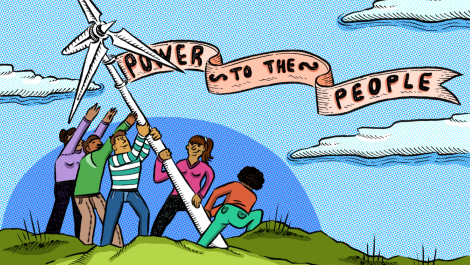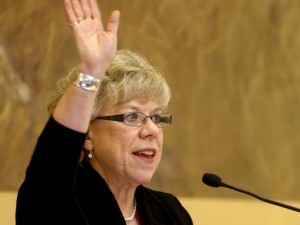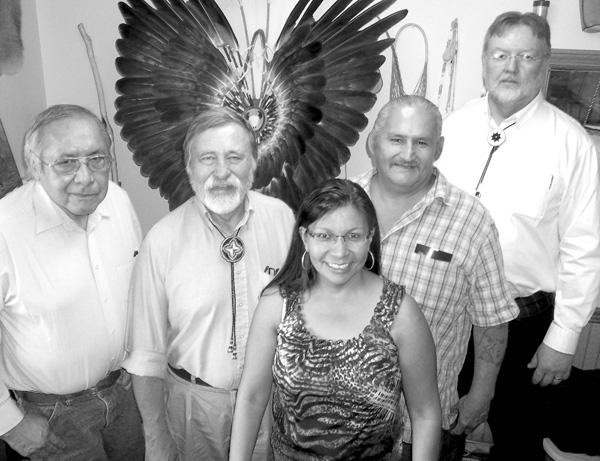By LACEY LOUWAGIE, Courthouse News Service
RAPID CITY, S.D. (CN) – Oglala Sioux claim in court that Jackson County, S.D., is obstructing Native Americans’ right to vote by refusing to set up a voter registration and balloting site on the remote Pine Ridge reservation.
Thomas Poor Bear, vice president of the Oglala Sioux Tribe, and three other tribal members sued Jackson County and its Board of Commissioners on Sept. 18, in Federal Court.
Reservation residents have to travel at least 27 miles to the county seat in Kadoka to register and vote, which is twice as far as white residents travel, according to the complaint.
Poor Bear asks that Jackson County set up a satellite voting office in the reservation town of Wanblee.
Lack of transportation compounds the problem.
The Census Bureau reported that nearly one in four Native Americans in Jackson County has no access to a vehicle, but that every white household does.
According to the Oglala Lakota Nation website: “Many people walk to reach their destinations,” but distance between communities and harsh South Dakota weather often make this difficult or impossible.
“What we filed on Thursday really isn’t anything new – it’s just happening in a different way,” plaintiffs’ attorney Matthew Rappold said in an interview.
“The record speaks for itself in how the state government has tried to make the right to vote inaccessible to Native American people.”
In 2004, U.S. District Judge Karen Schreier detailed South Dakota’s long history of voting discrimination in a 144-page opinion in Bone Shirt vs. Hazeltine , which claimed that South Dakota redistricting diluted the impact of Native American votes.
Before 1924, Native Americans could vote only after “severing tribal relations,” Schreier wrote.
Even after the 1924 American Indian Citizenship Act gave Native Americans full citizenship rights, South Dakota continued to ban them from voting or holding office until the 1940s.
Native Americans in the part of the Pine Ridge Reservation now in Jackson County could not vote until 1983, because people from “unorganized counties” – counties attached to other counties for judicial purposes – were forbidden to vote.
South Dakota’s Help America Vote Act task force supports the measure to place a voting office on the reservation, and has even reserved funds for Jackson County to do so, the complaint states.
Nonetheless, minutes from a County Commissioners’ meeting in June this year, cited in the complaint, state: “This would be an additional expense for Jackson County.”
Jackson County Auditor Vicki Williams, a defendant in the new case, declined to comment on the county’s position.
The Pine Ridge Indian Reservation in Southwestern South Dakota encompasses 11,000 square miles and spans three counties – Bennett, Shannon, and Jackson. It is home to more than 18,000, of which 88 percent are Native American, according to the 2010 census. The nationally famous Badlands of South Dakota also lie on Pine Ridge Reservation land.
About 39 percent of Native Americans live below the poverty line in Jackson County, which is nearly twice the percentage of whites, according to the Census Bureau’s 2006-2010 American Community Survey.
“Due … to the disparity in socio-economic status and the history of racial discrimination, Native American election turnout has historically been very low in South Dakota,” the complaint states, though South Dakota voter turnout is high overall.
Poor Bear wants Jackson County ordered to establish a satellite office on the reservation before the November elections, which will include gubernatorial candidates and constitutional amendments.
He claims there is “no justification” for not opening the satellite office, and that “the cost and burden on the county to designate a satellite office will be negligible in comparison to the irreparable harm that plaintiffs have already suffered, and will continue to suffer, as a result of the violation of their statutory and constitutional rights.”
Attorney Rappold, of Mission, S.D., said, “If we’re successful, and there are similar issues in other areas, this case would be something to tell the local folks: ‘You need to make sure you are doing things properly.'”








